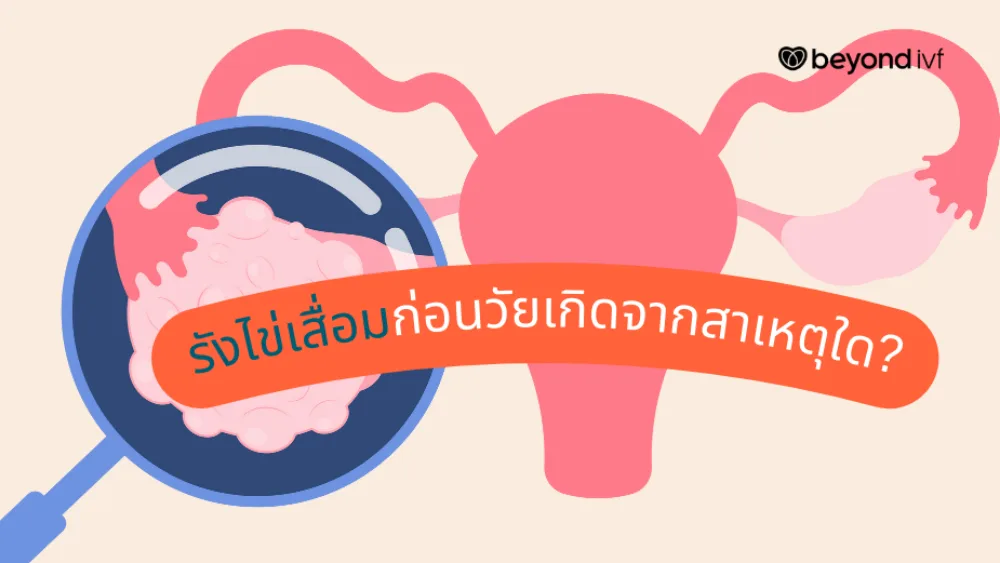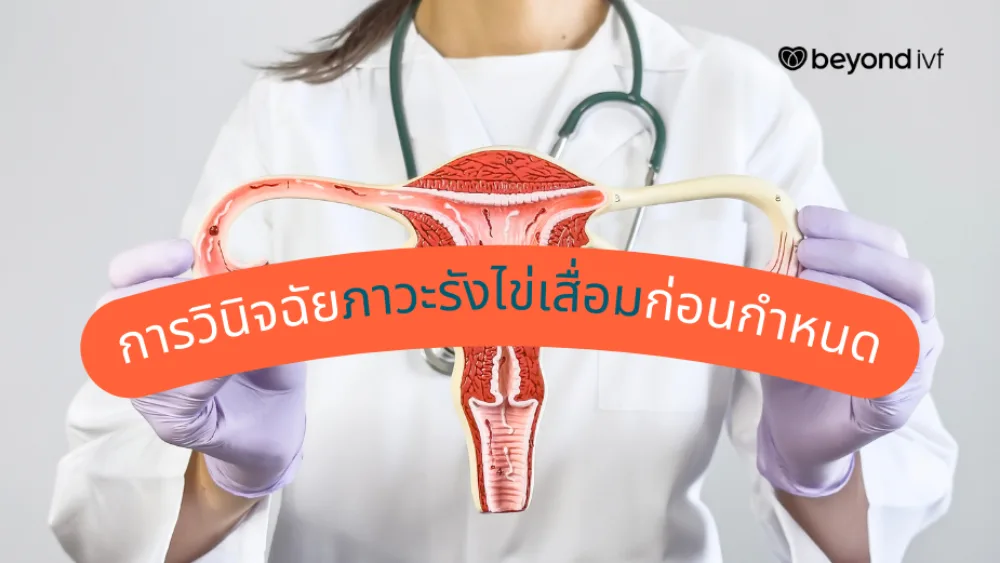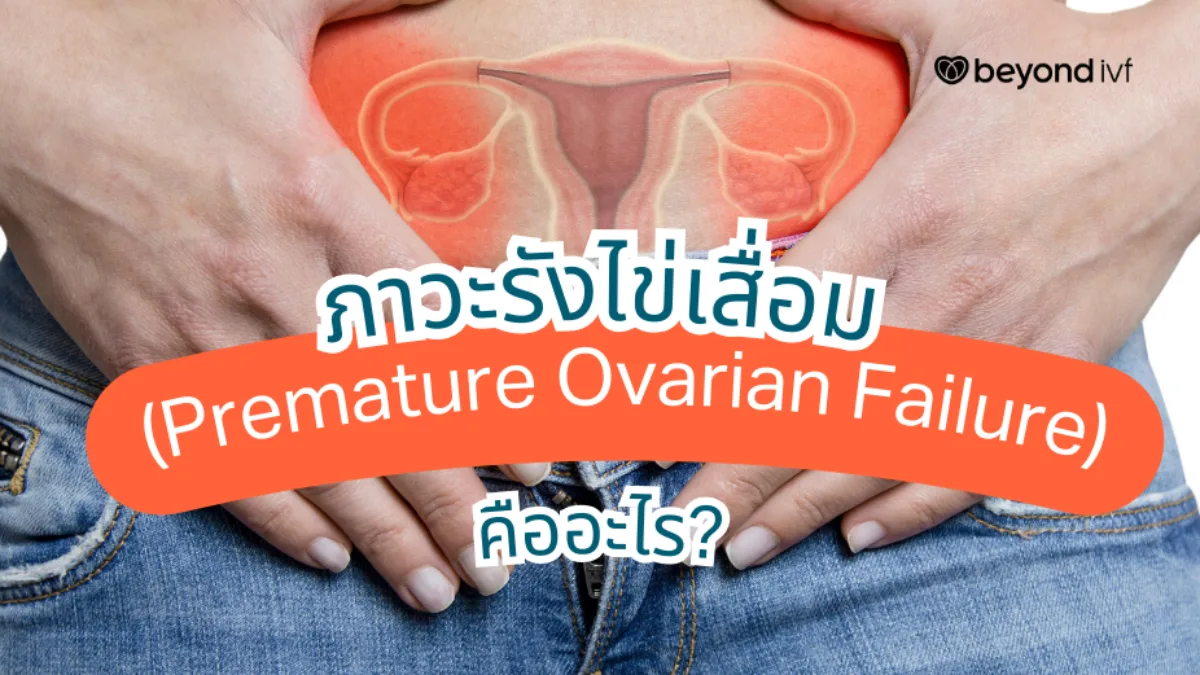Currently, premature ovarian insufficiency (POI) is occurring in many women, not just those in their 30s, but even in younger women. This is largely due to changes in modern lifestyles, where women work harder, leading to increased stress. With more work, there’s less time for rest, insufficient sleep, and irregular eating habits, all of which can affect hormone balance in the body.
Many may not realize what premature ovarian insufficiency really is, what causes it, what symptoms indicate the onset of this condition, and what treatment options are available.
Premature Ovarian Failure
Premature Ovarian Failure (POF) is a condition where the ovaries stop functioning prematurely, even though normally, the ovaries would cease functioning between the ages of 45-55. When premature ovarian failure occurs, the ovaries do not respond to the hormone Follicular Stimulating Hormone (FSH) from the pituitary gland, which normally regulates ovarian function.
As a result, when FSH is not working properly, it can cause symptoms such as irritability, fatigue, mood swings, dry skin, osteoporosis, and night sweats, similar to the symptoms experienced by women going through menopause.

What causes premature ovarian failure?
- Chromosomal Abnormalities
The most common chromosomal abnormality is Turner Syndrome, where ovarian development occurs normally during fetal life but the follicles deteriorate rapidly. In some cases, follicular degeneration or destruction begins in infancy or childhood, causing early ovarian failure. -
Autoimmune Conditions
Autoimmune conditions such as Lupus (SLE), autoimmune thyroid disorders, and parathyroid diseases can cause premature ovarian failure. In some cases, with proper treatment, ovarian function may return to normal. -
Surgical Causes
Surgery involving the ovaries can lead to reduced follicle count due to injury or removal of ovarian tissue. Disruption of the blood vessels that supply the ovaries may also result in ovarian failure due to lack of blood supply. -
Infections
Infections like mumps, tuberculosis, and malaria are rare causes of premature ovarian failure. However, in most cases, after successful treatment of the infection, ovarian function may return to normal. -
Chemotherapy
Chemotherapy or radiation therapy, especially when received in high doses or over multiple sessions, can damage ovarian tissue, leading to ovarian failure. -
Risky Behaviors
Environmental factors such as lifestyle changes, increased work stress, inadequate rest, and smoking can lead to reduced estrogen production. Additionally, exposure to pesticides and certain heavy metals can be toxic to ovarian tissue cells, increasing the risk of ovarian failure.

Signs and Symptoms of Premature Ovarian Failure:
Signs of Premature Ovarian Failure include:
-
Irregular periods – sometimes they may come late or be missed entirely.
-
Infertility – difficulty in conceiving.
-
Hot flashes – sudden feelings of heat.
-
Night sweats – excessive sweating during sleep.
-
Vaginal dryness – dryness in the vaginal area.
-
Restlessness or difficulty focusing.
-
Decreased libido – reduced sexual desire.
-
Dry skin – skin becomes easily dry.
-
Hair loss – thinning or loss of hair.
-
Difficulty sleeping – trouble falling or staying asleep.
Who is at risk for Premature Ovarian Failure?
Those at risk for Premature Ovarian Failure include:
-
Women aged between 35 and 40 years
-
Individuals with a family history of premature ovarian failure
-
Frequent ovarian surgeries increase the risk of premature ovarian failure
-
Those who have undergone chemotherapy, such as cancer patients

Diagnosis of Premature Ovarian Failure includes:
- Medical History
The doctor will take an initial history, such as whether there is a family history of premature ovarian failure, when the last menstrual period occurred, and how long it has been since the last period. If menstruation has been absent for more than a year, it may lead to hot flashes and irritability. -
Blood Test to Measure Hormone Levels
A blood test will be conducted to check the levels of hormones related to ovarian function, such as Follicle Stimulating Hormone (FSH). High levels of FSH indicate that the ovaries are no longer functioning (FSH 10-20 mIU/ml suggests premature menopause). Estrogen levels will also be measured, and they are likely to be low. -
Ultrasound Examination
An ultrasound may be used to check for the presence of primordial follicles. If no follicles are found, the doctor will diagnose premature ovarian failure. The most definitive test for diagnosis is the blood test to measure hormone levels.
Possible Side Effects of Premature Ovarian Failure
- Infertility
Premature ovarian failure immediately results in infertility because the ovaries stop functioning, leading to the absence of ovulation. In some cases, ovulation may still occur sporadically. For those who wish to have children, medications such as gonadotropins may be used to stimulate egg growth, and in vitro fertilization (IVF) may be considered as an option. -
Osteoporosis
When the ovaries stop functioning, the body lacks estrogen, a hormone that is important for bone development and strength. A deficiency in estrogen can lead to bone thinning and osteoporosis, increasing the risk of fractures.
Treatment for Premature Ovarian Failure
- Hormone Replacement Therapy (HRT)
Estrogen therapy can help prevent osteoporosis and alleviate hot flashes. Doctors often prescribe estrogen together with progesterone, especially for women who still have a uterus. The addition of progesterone protects the uterine lining from changes that could lead to cancer caused by using estrogen alone. -
Calcium and Vitamin D Supplements
Calcium and vitamin D supplements are essential for preventing osteoporosis. Doctors may recommend bone density tests before starting supplements to establish a baseline for bone health. -
Fertility Treatment for Premature Ovarian Failure
For women with premature ovarian failure who want to conceive, a small percentage may still ovulate occasionally and become pregnant. Others may be treated with ovulation-stimulating medications, such as gonadotropins, to help eggs mature and be released. If ovulation is not possible, egg donation combined with assisted reproductive technologies may be used to help achieve pregnancy.
Self-care Guidelines for Premature Ovarian Failure
Self-care guidelines for individuals with premature ovarian failure include the following:
-
Exercise regularly to keep the body strong and prepared.
-
Eat a balanced diet with all five food groups, focusing on nutritious options that benefit your body.
-
Maintain a healthy weight within the standard range.
-
Avoid caffeine and alcohol.
-
Quit smoking.
-
The most important aspect is to consult a specialist to check your overall health and discuss options for a safe pregnancy.
-
Visit a menopause clinic to receive treatment and low-dose female hormones to help reduce issues caused by hormone deficiency.
-
Although these initial methods may not fully restore ovarian function, they can help improve ovarian efficiency and reduce the likelihood of fertility problems.
Preventive measures for premature ovarian failure include:
-
For patients who need treatment with radiation or chemotherapy, if planning for pregnancy, doctors recommend using the technology of "egg freezing" to preserve eggs from damage caused by radiation.
-
Reduce risk behaviors that damage eggs, such as drinking alcohol and smoking.
-
Eat a balanced diet with all five food groups, and avoid processed foods, high-fat foods, and fast food.
-
Consult with a doctor for advice and guidance on planning for pregnancy.
Conclusion
Premature ovarian failure is a condition where the ovaries stop functioning earlier than normal, which can occur in women under the age of 30. The causes of this condition include a family history of premature ovarian failure, which may increase the risk for female offspring. Symptoms that may indicate you are entering this phase include hot flashes, irritability, and hormonal changes in the body.
Treatment for premature ovarian failure typically involves hormone replacement therapy with estrogen to help alleviate hot flashes, prevent osteoporosis, and progesterone to protect the uterine lining. If you are concerned that you may be entering premature ovarian failure, you can visit a doctor for consultation and body checks.
At Beyond IVF, we offer comprehensive consultations on women’s health, including checks for premature ovarian failure. If you have any questions, feel free to contact us on Line: @beyondivf






